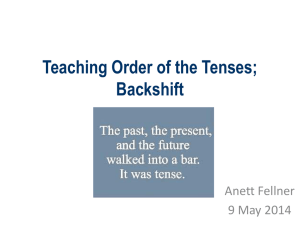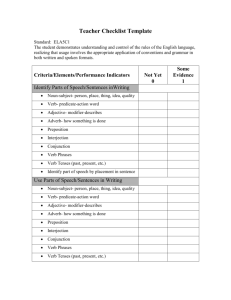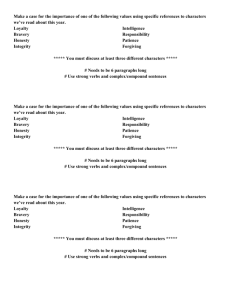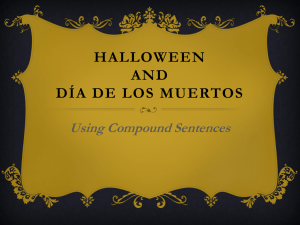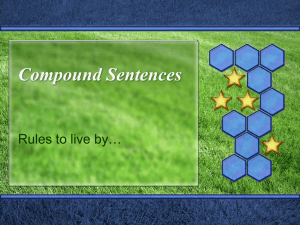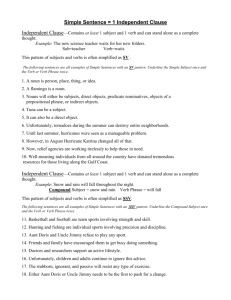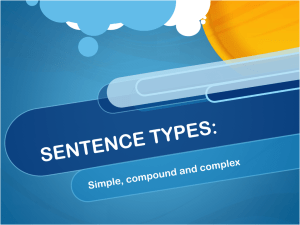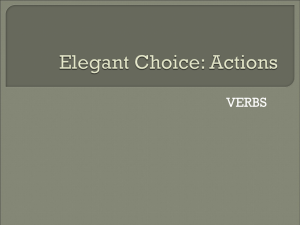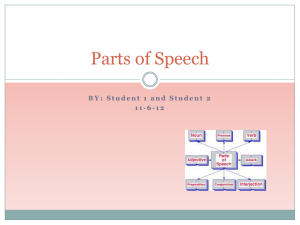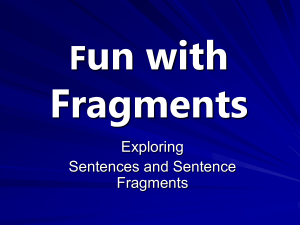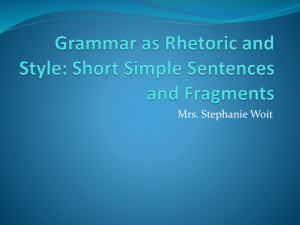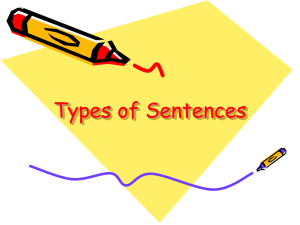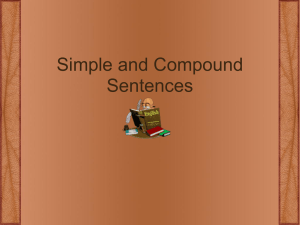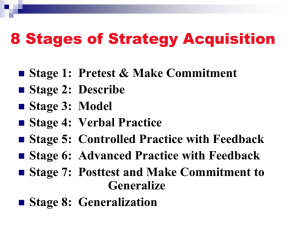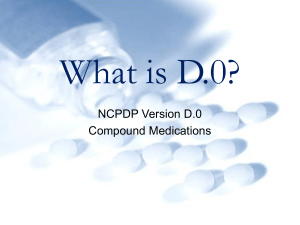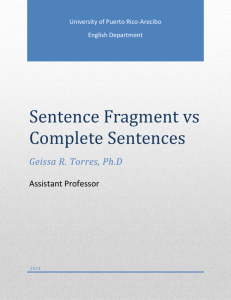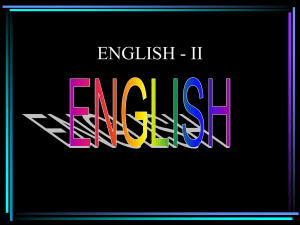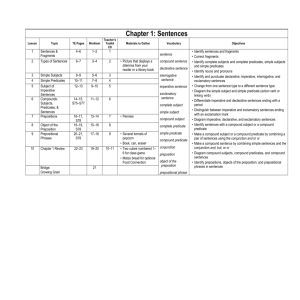Subjects and predicates
advertisement
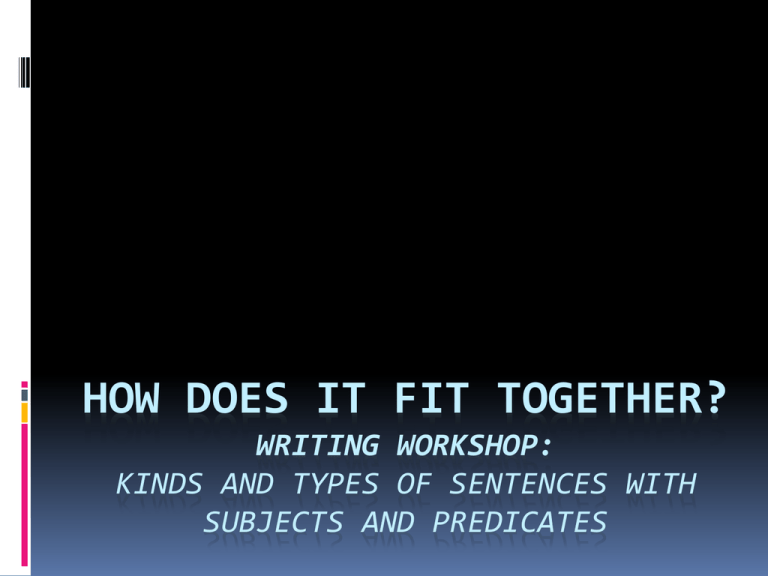
HOW DOES IT FIT TOGETHER? WRITING WORKSHOP: KINDS AND TYPES OF SENTENCES WITH SUBJECTS AND PREDICATES Sentences Definition: a word or word group that contains a subject and a verb and that expresses a complete thought. A sentence begins with a capital letter and ends with a period, a question mark, or an exclamation point. Examples of Sentences: She won a prize for her book. Why did you stop running? Wait! (The understood subject is you.) Sentence Fragments Definition: a group of words that looks like a sentence but does not contain both a subject and a verb or does not express a complete thought. Examples: Sailing around the world. (fragment) They are sailing around the world. (sentence) The hike through the Grand Canyon. (fragment) The hike through the Grand Canyon was long and hard. (sentence) Sentence Fragments After they pitched the tent. (fragment) After they pitched the tent, they rested. (sentence) Practice: Sentences and Sentence Fragments Identify the following word groups as a sentence or sentence fragment. “S” for sentence or “SF” for sentence fragment 1. Do you know what happened during her boat trip? 2. Down the rapids of the Colorado river. 3. At first her boat drifted calmly through the Grand Canyon. 4. Then the river dropped suddenly. 5. And became foaming rapids full of dangerous boulders. Subjects • Definition: tells whom or what the sentence is about. Examples: Nicholasa Mohr is a writer and an artist. The girls on the team were all good students. He shared his lunch with the boy on the other team. Swimming is a good exercise. Finding the Subject Ask who or what is doing something or whom or what is being talked about. The subject may come at the beginning, middle, or end of a sentence. Examples: The pitcher struck Felicia out. [Who struck Felicia out? The pitcher did.] After practicing for hours, Timmy bowled two strikes. [Who bowled two strikes? Timmy did.] Finding the Subject Examples: How kind you are! [Who is kind? You are.] When will the afternoon train arrive? [What will arrive? The afternoon train will.] Hiding in the tall grass was a baby rabbit. [What is hiding? A baby rabbit was.] Simple Subject • A simple subject is the main word or word group that tells whom or what the sentence is about. • A complete subject consists of all the words that tell whom or what a sentence is about. Examples: The four new students arrived early Complete Subject: The four new students Simple Subject: students Examples: A round walnut table with five legs stood in the middle of the dining room. Complete Subject: A round walnut table with Simple Subject: five legs table Is the winner of the go-cart race present? Complete Subject: the winner of the go-cart Simple Subject: race winner More Info on Simple Subjects A simple subject may consist of one word or several words. Jets often break the sound barrier. (one word) Does Aunt Carmen own a grocery store? (two words) On the library shelf was The Island of Blue Dolphins. (five words) Identifying Subjects Identify the subject in the following sentences by underlining the word or words involved. 1. Born in 1934 in Oklahoma, Momaday lived on Navajo and Apache reservations in the Southwest. 2. Momaday’s father was a Kiowa. 3. The book includes poems, an essay, and stories about the Kiowa people. 4. The Way to Rainy Mountain was published in 1969. Compound Subjects and Compound Verbs A compound subject consists of two or more subjects that are joined by a conjunction and that have the same verb. The conjunctions most commonly used to connect the words of a compound subject are and and or. Examples: Paris and London remain favorite tourist attractions. (two) Among my hobbies are reading, snorkeling, and painting. (three) Nelson Mandela or Archbishop Desmond Tutu will speak at the conference. (two) Practice: Compound Subjects Underline the subject or subjects in each of the following sentences. 1. The national parks and monuments of the United States include many of the world’s most spectacular landforms. 2. In river systems throughout the world, canyons and gorges are cut into the earth by erosion. 3. Many rapids and waterfalls have also originated through the process of erosion. Compound Verbs A compound verb consists of two or more verbs that are joined by a conjunction and that have the same subject. The conjunctions most commonly used to connect the words of a compound verb are and, or, and but. Examples: The rain has fallen for days and is still falling. (two) The team played well but lost the game anyway. (two) Will Rolando mop the floor or wash the dishes? (two) Practice: Compound Verbs Underline the verb or verbs present in each of the following sentences. 1. They used place markers and threw bones or sticks as dice. 2. Senet looked like an easy game but was actually difficult. 3. These squares could help players or could block their pieces. Identifying Subjects and Predicates Circle the subject or subjects of the sentence; underline the predicate of each sentence as well. 1. Settlers faced and overcame many dangers. 2. Every winter many skiers rush to the Grand Tetons. 3. Are some of these taxes also known today as “tribute”? 4. High officials and the sick did not, however, pay taxes. 5. The Codex Mendoza is a formal record of the Aztecs’ taxes.
